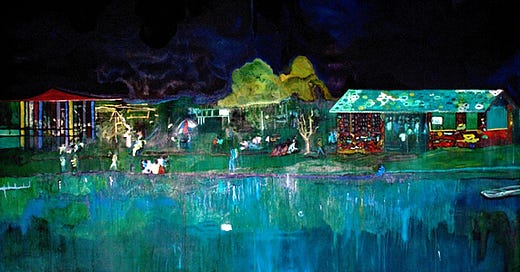Coming out of the pandemic two years ago, I was in an expansive mood. I was going out and meeting new people, attending every picnic under the sun, and spending considerable time posting on Twitter, even venturing into TikTok land. I had a shovel in hand, and I was rebuilding my life, filling a vacancy from getting out of a long relationship.
These days I notice my attention drawing inward. I think it’s a good sign: the perennials I planted two seasons ago are in bloom. The garden of my life feels full. I’m not seeking anything. I have relationships that require tending, a novel I’m re-plotting, more books to nourish me than I can possibly read, hobbies I barely have time to scratch, and a full-time job supporting it all.
Consequently, I’ve found it hard to keep up online. I spend maybe five minutes a week on Twitter. I’m always playing catch up with my newsletter subscriptions. Forget Substack notes. Forget TikTok. I don’t have time to scroll another feed.
I wish I could say I’m riding out into the sunset of digital minimalism, but the reality is, I feel conflicted and a little guilty about my unintended withdrawal from the internet. Twitter and Substack provided solace and a sense of community at a time when I was feeling adrift. In retreating from these platforms, I fear that I’m missing out on connections with people who care what I have to say. That there are even people out there who actually want to know what’s on my mind is not something I take for granted.
The few times I’ve attempted to get back into the rhythm of tweeting and partaking in the internet stream-of-consciousness have felt forced, like performing a chore. It’s become this nagging thing in the back of my brain. If I’m experiencing even this much anxiety over it, I can’t imagine what it’s like to run a massive account with tens or hundreds of thousands of followers. At what point does a tool for social connection become a shackle?
Writing this Substack is a challenge because it competes with the book for my attention, and the book always wins. But what’s hard about writing a book that you intend to publish traditionally is that you don’t have anything to show for all the weeks and months and years of work you’ve put in. So even if you’re making progress, you don’t get the social validation and instant gratification of publishing a Substack post, a tweet or an Instagram reel that everyone can react to. And so I feel a tug in both directions, between wanting to burrow deep into the book and wanting to be a contributing citizen of the internet.
There’s a distinction between writing consistently and publishing consistently. If you’re serious about writing, the former is much more important. A wonderful thing about the internet is that anyone can publish anything. A terrible thing about the internet is that anyone can publish anything. Social media trains us to seek constant validation. It feels good to have people “like” what we share. It feels good to be seen.
As much as I appreciate certain aspects of internet culture’s “default public” ethos, there’s something to be said about the benefits of creating in the dark. Brandon Sanderson wrote sixteen books before publishing his first. Six-teen. It’s enough to make me not resent him for dropping a doorstop a year. He and V.E. Schwab, another outrageously prolific author, discuss his writing journey on her podcast and agree that “it’s great for your craft and your mental health to write in obscurity for a while.” We need to protect the private space of creation where artists can experiment and do deep work without worrying about the needs and opinion of the public.
Technology supposedly makes us more efficient, but is it really saving us much time when it’s eating away at our attention spans? From Cal Newport to Oliver Burkeman to Jenny Odell, many have written about how to live in an age of constant distractions. In a recent Vulture piece by Rebecca Jennings, Gloria Mark, an informatics professor at UC Irvine, says that one way to prevent the cycle of trying hard to focus and failing is to “build the kind of life that’s full of replenishing empty space—taking a walk outside, writing poetry, chatting with a colleague, or anything that doesn’t revolve around the pressure to produce.”
Having empty space is glorious. Having empty space and not being able to enjoy it because of the pressure to demonstrate that we’ve done something productive is a tragic side effect of the internet. I still believe in the power of online communities. But I worry that the dopamine-hit mechanism built into these platforms is hijacking our ability to focus on what really matters, to create from a place of genuine passion and curiosity, rather than out of a sense of obligation, a fear of missing out.





always a pleasure when you post. I always find myself relishing even the shortest pieces. as truthful and beautiful as ever.